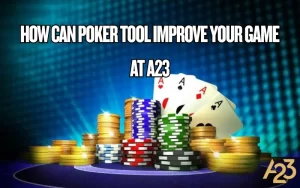Poker is a game of skill, a23 strategy, and psychology that has captivated players around the world for centuries. Whether you are a novice looking to learn the ropes or an experienced player aiming to refine your skills, understanding the strategies that can lead to success is essential. In this comprehensive guide, we will explore effective poker strategies tailored for A23 players, helping you master the game and improve your chances of winning.
Understanding the Basics of Poker
Before diving into advanced strategies, it’s crucial to have a solid understanding of the basic rules and concepts of poker. The most popular variant of poker is Texas Hold’em, which is often the focus of strategy discussions. Here are some fundamental concepts every player should know:
1. The Objective of Poker
The primary objective in poker is to win chips by either having the best hand at showdown or convincing your opponents to fold their hands. Understanding when to bet, raise, call, or fold is key to achieving this goal.
2. Hand Rankings
Familiarize yourself with poker hand rankings, as they determine the strength of your hand. The rankings, from highest to lowest, are as follows:
- Royal Flush
- Straight Flush
- Four of a Kind
- Full House
- Flush
- Straight
- Three of a Kind
- Two Pair
- One Pair
- High Card
3. Betting Rounds
In Texas Hold’em, there are four betting rounds: pre-flop, flop, turn, and river. Each round provides players with the opportunity to bet, check, raise, or fold based on the strength of their hands and the community cards revealed.
Essential Strategies for A23 Players
Now that you have a grasp of the basics, let’s delve into strategies that can help A23 players enhance their poker game.
1. Starting Hand Selection
One of the most critical aspects of poker strategy is selecting the right starting hands. A23 players should focus on playing strong hands while being selective about weaker ones. Here are some tips for starting hand selection:
- Play Premium Hands: Strong hands like pocket aces (AA), pocket kings (KK), and ace-king (AK) should always be played aggressively.
- Position Matters: Your position at the table significantly impacts your starting hand selection. In early positions, play tighter and only enter the pot with premium hands. In later positions, you can widen your range and play more speculative hands.
- Avoid Weak Hands: Steer clear of weak hands like low unsuited cards, as they are less likely to improve and win pots.
2. Understanding Position
Position is a crucial element in poker strategy. It refers to where you sit at the table in relation to the dealer. The later your position, the more information you have about your opponents’ actions. Here’s how to leverage position effectively:
- Early Position: Play conservatively and stick to strong hands, as you have less information about your opponents.
- Middle Position: You can start to widen your range slightly, but still prioritize strong hands.
- Late Position: Use your position to your advantage by playing a broader range of hands. You can also steal blinds and apply pressure on opponents who have already acted.
3. Reading Opponents
Being able to read your opponents is a vital skill in poker. Observing their betting patterns, body language, and tendencies can provide valuable insights into their hands. Here are some tips for reading opponents effectively:
- Watch for Betting Patterns: Pay attention to how your opponents bet in different situations. Are they aggressive or passive? Do they bluff often? Understanding their tendencies can help you make informed decisions.
- Identify Player Types: Classify your opponents into categories such as tight-aggressive, loose-aggressive, tight-passive, and loose-passive. This classification can guide your strategy against them.
- Look for Tells: While online poker may limit physical tells, you can still observe betting behavior and timing. A sudden large bet may indicate strength, while a quick check could suggest weakness.
4. Mastering Bluffing Techniques
Bluffing is an essential part of poker strategy, but it must be executed wisely. A successful bluff can win you pots even when you don’t have the best hand. Here are some tips for effective bluffing:
- Choose the Right Moments: Bluff when the board texture is favorable for a strong hand. For example, if the community cards are coordinated, you can represent a strong hand that connects with the board.
- Consider Your Opponents: Bluff against players who are likely to fold. If you’re up against a calling station who rarely folds, your bluff is less likely to succeed.
- Maintain Consistency: Your betting patterns should be consistent whether you’re bluffing or holding a strong hand. If you suddenly change your betting style, opponents may catch on.
5. Pot Odds and Expected Value
Understanding pot odds and expected value is crucial for making informed decisions in poker. Pot odds refer to the ratio of the current size of the pot to the size of the bet you need to call. Here’s how to use pot odds effectively:
- Calculate Pot Odds: To determine your pot odds, divide the amount of money in the pot by the amount you need to call. For example, if the pot is 100andyouropponentbets50, the pot odds are 2:1.
- Compare to Odds of Hitting Your Hand: Assess the likelihood of completing your drawing hand. If the odds of hitting your hand are better than the pot odds, it’s a profitable call.
- Expected Value (EV): Calculate the expected value of your decisions. If a play has a positive EV, it means that over time, it will be profitable. This concept helps you make long-term strategic decisions rather than focusing solely on short-term results.
6. Bankroll Management
Effective bankroll management is essential for long-term success in poker. It ensures that you can withstand the inevitable ups and downs of the game. Here are some tips for managing your bankroll:
- Set a Budget: Determine how much money you can afford to lose and stick to that budget. Avoid playing with money that you cannot afford to lose.
- Choose the Right Stakes: Play at stakes that are appropriate for your bankroll. A common guideline is to have at least 20-30 buy-ins for cash games and 100 buy-ins for tournaments.
- Avoid Chasing Losses: If you experience a losing streak, resist the urge to increase your stakes to recover losses. Stick to your planned bankroll management strategy.
7. Continuously Improve Your Game

Poker is a game of constant learning and adaptation. To master poker strategies, A23 players should continuously seek to improve their skills. Here are some ways to enhance your game:
- Review Your Sessions: After each session, take time to review your hands and decisions. Identify mistakes and areas for improvement.
- Study Strategy Resources: Read books, watch videos, and follow poker forums to learn from experienced players. There are countless resources available that can provide valuable insights into advanced strategies.
- Practice Regularly: The more you play, the better you will become. Regular practice helps reinforce your skills and allows you to apply new strategies in real-time.
8. Embrace the Psychological Aspect
Poker is not just about the cards; it’s also a psychological battle. Understanding the mental aspect of the game can give you a significant edge. Here are some psychological strategies to consider:
- Stay Calm and Focused: Maintain your composure, even during challenging situations. Emotional decisions can lead to mistakes, so practice mindfulness and focus on the game.
- Use Deception Wisely: While bluffing is a part of the game, it’s essential to balance your play. If you bluff too often, opponents will catch on. Mix up your play to keep them guessing.
- Control Your Table Image: Be aware of how your opponents perceive you. If you establish a tight image, you can leverage that to bluff effectively later on.
Conclusion
Mastering poker strategies is a journey that requires dedication, practice, and a willingness to learn. For A23 players, understanding the fundamentals, refining your skills, and continuously improving your game are essential steps toward success. By implementing the strategies outlined in this guide, you can enhance your poker skills, make informed decisions, and ultimately increase your chances of winning at the tables. Remember, poker is not just a game of luck; it’s a game of skill, strategy, and psychology. Embrace the challenge, and enjoy the journey of becoming a master poker player.








